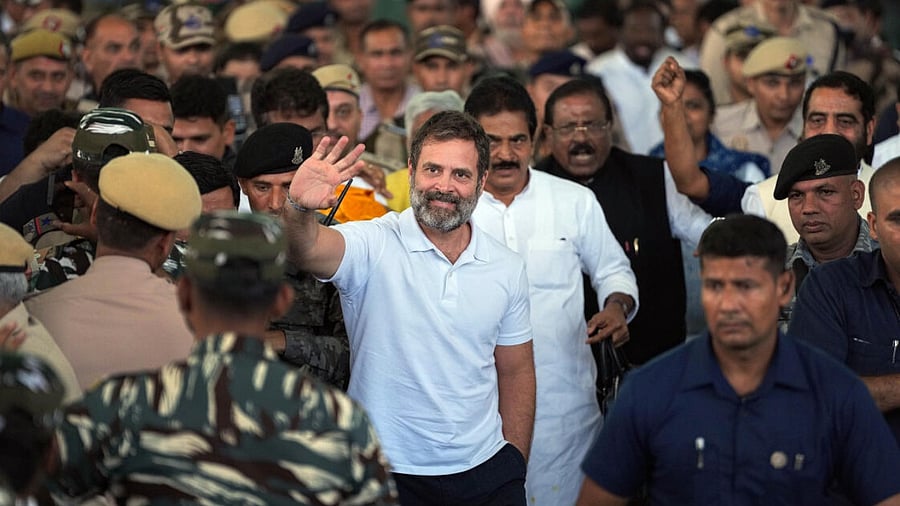
It does not lend any credit to India’s democracy that the country’s most prominent Opposition leader has been disqualified from parliament for an offence which in normal discourse would not be considered important enough to invite such a serious punitive response from the system. It would lower the stature and credibility of the system and push the country into the ranks of authoritarian regimes that hound Opposition leaders and critics and take out all legal wares and other means to silence them and to ensure that they do not participate in the political process. The last major disqualification of an important leader happened in the country when the then Prime Minister Indira Gandhi was disqualified in 1975 for violation of electoral laws. That was considered a penalty, to be paid with prime ministership, for an offence similar to a traffic offence. Rahul Gandhi’s offence would be viewed as even less serious than that, especially because the disqualification follows a judgement which is considered to have legal infirmities. Indeed, even the procedure adopted to declare him disqualified is contestable.
It is the judgement of a Surat court against Rahul Gandhi in a defamation case that has triggered the disqualification. The court sentenced Gandhi to two years’ imprisonment in a case filed by Surat BJP MLA Purnesh Modi, who claimed that he was defamed by Gandhi’s words in an election meeting in Karnataka in 2019. Gandhi had said: “How come all the thieves have Modi as the common surname?” This was after listing three names — two fugitives from law, Nirav Modi and Lalit Modi, and Prime Minister Narendra Modi in the context of the Rafale fighter jets controversy. The court has awarded the maximum punishment under the law to Gandhi as it felt that the purpose of defamation law wouldn't have been served by a lesser punishment. Courts do not generally award the maximum punishment to first-time offenders for non-heinous offences. It is the award of the two-year sentence that has led to Rahul Gandhi’s disqualification as an MP. This is significant because a lesser punishment would not have incurred him disqualification.
Rahul Gandhi was granted bail and a stay on operation of the judgement for one month to allow him to appeal against it, but the disqualification came into force because the conviction stays. The Congress has said that the judgement would be contested in higher courts. The quick disqualification has drawn attention because all the details of the judgement are not known yet and whatever is known has raised questions. The court’s interpretation of the defamation law in the case is contested in legal circles. There is a view that the complainant did not have the locus standi to raise the issue in Surat. Courts have in the past generally shied away from applying the defamation law to statements made by politicians in the heat of election campaigns. It is also pointed out that the defamation law can be enforced only if an individual as an individual was sought to be defamed with malicious intent, not as a member of a group. It would be a stretch to imagine that Rahul Gandhi meant to defame all those whose surname was Modi. His target could only have been Prime Minister Modi, and none of those who were specifically named by him has raised a complaint of defamation. The context of a speech gives meaning to its words and that should be considered when it is tested against the law.
It is ironic that Rahul Gandhi, who is the most lampooned and defamed politician in the country, has become a victim of the weapon of defamation. He has been called Pappu, Mir Jafar, traitor, anti-national and many other names in the past many years. There is also irony in the fact that while he is being pursued and harassed, many others who have committed much more serious crimes have got away with them. Political leaders and so-called religious personalities who have called for genocide have found no action taken against them. Others who make hate speeches and open calls for strife and threaten peace and social harmony also do not find any action coming against them. Instead, people who criticise the government and oppose and disagree with it are hauled up under various laws. The most stringent laws like the UAPA are imposed on them. Cases are filed in distant states and politicians are picked up from other states. Central investigating agencies are unleashed against Opposition politicians and critics. The action against Rahul Gandhi would be continued as a part of these tactics to intimidate and silence the Opposition.
Rahul Gandhi’s comment made from a public forum was in poor taste and it reflected the low levels to which political discourse has sunk in the country. All politicians, including the Prime Minister, are guilty of lowering the standards of public discourse. But some are picked out, picked up and made to pay a price. The defamation verdict and the disqualification will be used by the BJP as one more weapon to escalate its attacks on Gandhi as he has emerged as the most consistent and strident critic of the government, the BJP and Modi. That has made him the No 1 target of all of them. There may be multiple aims for this, including putting him away in jail or using his sentencing for propaganda in the run up to the 2024 Lok Sabha elections. In the present circumstance, he will not be able to contest the 2024 elections if he does not get a reprieve from the courts. Imagine the largest democracy in the world, which the Prime Minister claims to be the ‘mother of democracy’, going to elections with its most important Opposition leader in jail and unable to contest for a remark he made targeting the Prime Minister during an election rally speech. Such a thing happens only in authoritarian countries. Are we taking lessons in democracy from Putin’s Russia or some banana republic?
